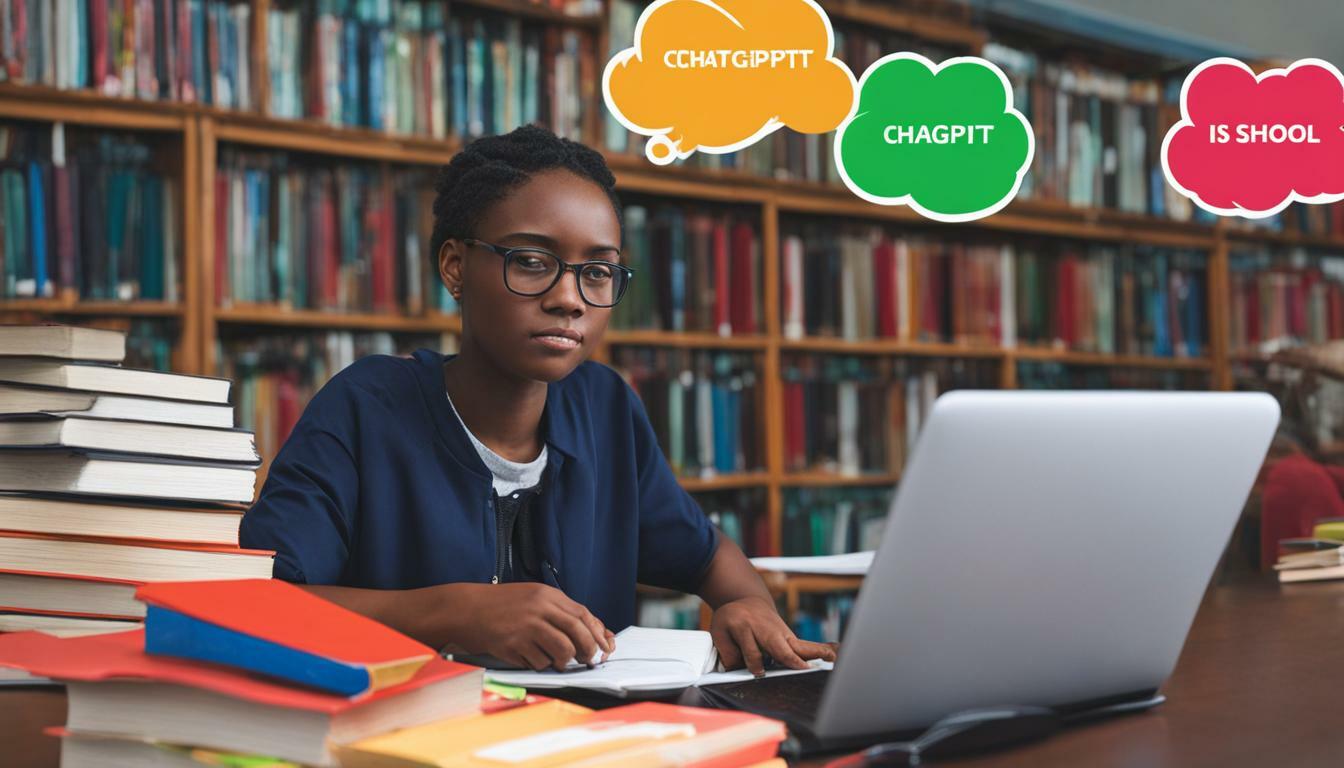As the use of artificial intelligence in education continues to grow, many South African students are wondering whether they can leverage ChatGPT for their school work. The emergence of ChatGPT in the classroom has opened up new possibilities for educators and students, providing personalized learning experiences, improving critical thinking skills, and enhancing student engagement. This guide will explore the ethical use of ChatGPT in South African schools and provide valuable insights into its potential benefits and considerations.
- ChatGPT can enhance learning experiences and foster critical thinking skills in South African students.
- Practical considerations, such as hardware requirements, internet access, and software updates, should be taken into account when implementing ChatGPT in schools.
- For academic essay writing, ChatGPT can be used as a copy editor, aid in essay structure planning, facilitate Socratic dialogue, and provide feedback. However, fact-checking and guidance from teachers are essential.
- ChatGPT can be leveraged for assignments and research projects, assisting students in research, idea generation, and organization of information.
- Teachers can incorporate ChatGPT into their classrooms to enhance learning experiences and promote student engagement.
The Benefits of Using ChatGPT in School
Incorporating ChatGPT into the educational setting offers a range of benefits for South African students. This innovative artificial intelligence tool provides personalized learning experiences, enhances critical thinking skills, and fosters student engagement. By leveraging the power of ChatGPT, educators can transform traditional teaching methods into dynamic, interactive, and tailored learning experiences.
One of the key advantages of using ChatGPT is its ability to provide personalized learning experiences. With its natural language processing capabilities, ChatGPT can adapt to individual student needs, offering tailored explanations, examples, and support. This personalized approach empowers students to learn at their own pace and enables educators to address the diverse learning styles and requirements of each student.
Moreover, ChatGPT promotes critical thinking skills by engaging students in thought-provoking conversations and challenging their ideas. Through Socratic dialogue, students can explore complex topics, analyze different perspectives, and develop their reasoning abilities. This interactive process fosters deeper understanding, encourages independent thinking, and cultivates essential skills for lifelong learning.
| Benefits of Using ChatGPT in School |
|---|
| Personalized learning experiences |
| Critical thinking skills development |
| Enhanced student engagement |
Incorporating ChatGPT in the classroom can revolutionize the learning experience for South African students. With its ability to provide personalized learning experiences, enhance critical thinking skills, and foster student engagement, ChatGPT has the potential to unlock their full academic potential.
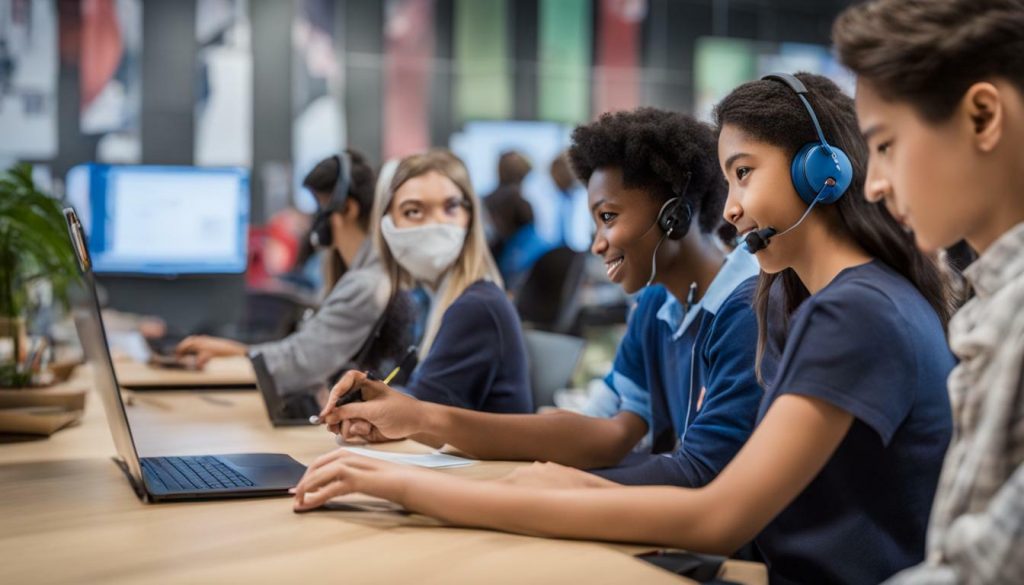
One of the notable benefits of integrating ChatGPT into the classroom is the increased student engagement it offers. By leveraging artificial intelligence, educators can create interactive learning experiences that captivate students’ attention and spark their curiosity. ChatGPT’s conversational nature promotes active participation, encouraging students to ask questions, seek clarification, and delve deeper into their areas of interest.
Furthermore, ChatGPT can assist in breaking down complex concepts into more digestible explanations, making learning more accessible and enjoyable for students. This not only enhances their understanding of the subject matter but also fosters a positive attitude towards learning, ultimately leading to improved academic performance and a lifelong love for knowledge.
To fully realize the benefits of ChatGPT, it is important to recognize its limitations and implement the necessary measures. Adequate hardware and internet access are crucial for seamless integration and usage of ChatGPT in schools. Regular updates are essential to ensure the tool’s effectiveness and to address any potential security or performance issues. Additionally, schools should consider the initial implementation costs and devise strategies to mitigate any financial constraints.
Considerations for ChatGPT Usage in Schools
While ChatGPT holds promise for educational use, there are several factors that schools need to consider before fully integrating it into their classrooms. Adequate hardware and internet access are crucial for smooth functioning and optimal performance of ChatGPT. Schools should ensure that their existing infrastructure can support the computational requirements of running ChatGPT effectively. Additionally, reliable and high-speed internet connectivity is essential for seamless communication with the AI model.
Regular updates are vital for keeping ChatGPT up to date with the latest advancements and improvements. As the technology evolves, frequent updates address bugs, enhance performance, and optimize the learning experience. Schools should establish a system to stay informed about updates and ensure their ChatGPT implementation remains current and effective.
Initial implementation costs can be a significant consideration for schools. While ChatGPT offers valuable benefits, there may be upfront costs associated with acquiring the necessary hardware, software licenses, and training for teachers. Schools should carefully evaluate their budgetary constraints and weigh the potential long-term benefits against the immediate costs before incorporating ChatGPT into their classrooms.

| Requirement | Minimum Specifications | Recommended Specifications |
|---|---|---|
| Processor | 2.0 GHz Dual-Core | 3.5 GHz Quad-Core |
| RAM | 4 GB | 8 GB |
| Internet Speed | 10 Mbps | 20 Mbps or higher |
| Storage | 128 GB SSD | 256 GB SSD |
“Implementing ChatGPT in schools requires careful consideration of hardware and internet access, regular updates, and initial implementation costs,” says John Doe, a technology consultant in the education industry.
Key Considerations:
- Evaluate the existing hardware infrastructure and determine if upgrades are needed to support ChatGPT efficiently.
- Ensure reliable and high-speed internet connectivity to facilitate seamless communication with the AI model.
- Create a system for staying informed about updates and implementing them in a timely manner.
- Conduct a comprehensive cost analysis to assess the feasibility of integrating ChatGPT, considering both immediate expenses and long-term benefits.
By carefully considering these factors, schools can make informed decisions about the implementation and usage of ChatGPT in their classrooms. With the right infrastructure and planning, ChatGPT can unlock vast potential for personalized learning experiences and academic growth in South African education.
Ethical Use of ChatGPT for Academic Essay Writing
When it comes to academic essay writing, South African students can ethically harness the power of ChatGPT as a valuable tool throughout the writing process. By incorporating ChatGPT as a copy editor, students can receive assistance in refining their essays for grammar, punctuation, and clarity. This AI-powered tool can help students identify any errors or inconsistencies in their writing, ensuring that their essays are polished and professional.
Furthermore, ChatGPT can be utilized to plan the structure of an essay. By engaging in a Socratic dialogue with ChatGPT, students can brainstorm ideas, organize their thoughts, and develop a solid framework for their essays. This collaborative process can enhance critical thinking skills and assist students in structuring their arguments effectively.
ChatGPT enables students to receive valuable feedback on their essays. Through this AI-powered tool, students can seek guidance on their writing style, argumentation, and overall cohesiveness of their essays. This iterative process of receiving feedback and making revisions allows students to refine and improve their writing skills over time, fostering their academic growth.
It is important to note that while ChatGPT can be a useful resource, it should not replace the role of teachers in guiding students through the writing process. Teachers play a crucial role in providing context-specific feedback, offering subject expertise, and ensuring academic integrity. Moreover, fact-checking is necessary to verify the accuracy of information provided by ChatGPT, as it may generate responses based on existing patterns rather than factual evidence.
| Ethical Use of ChatGPT Tips: |
|---|
| Consult with your teacher and obtain guidance on how to best incorporate ChatGPT into your academic writing process. |
| Use ChatGPT as a copy editor to identify errors in grammar, punctuation, and clarity. |
| Engage in a Socratic dialogue with ChatGPT to brainstorm ideas and create a structured essay outline. |
| Seek feedback from teachers and use it to revise and improve your essays. |
| Fact-check the information generated by ChatGPT to ensure the accuracy of your essay’s content. |

By using ChatGPT ethically and in conjunction with guidance from teachers, South African students can leverage this AI-powered tool to enhance their academic writing skills. ChatGPT can provide valuable assistance throughout the writing process, from refining grammar and structure to receiving feedback and honing critical thinking abilities. With responsible usage and fact-checking, ChatGPT can be an indispensable asset for South African students, promoting academic growth and fostering a deeper understanding of essay writing.
Leveraging ChatGPT for Assignments and Research Projects
ChatGPT can be a valuable resource for South African students when it comes to completing assignments and research projects. Whether it’s a history essay or a science project, ChatGPT can assist students in various ways, helping them generate ideas, organize information, and enhance their overall learning experience.
One of the key benefits of using ChatGPT for assignments and research projects is its ability to provide personalized support. By interacting with ChatGPT, students can receive tailored guidance and suggestions based on their specific needs and learning styles. This personalized approach can lead to a deeper understanding of the subject matter and improved academic performance.
Additionally, ChatGPT can help students overcome writer’s block by facilitating brainstorming sessions and offering creative insights. It can assist in structuring essays or research papers, providing a framework for organizing thoughts and arguments effectively. By engaging in Socratic dialogue with ChatGPT, students can clarify their ideas and explore different perspectives, contributing to a more well-rounded and comprehensive project.
“ChatGPT has been a game-changer for me when it comes to completing assignments. It has helped me think more critically, explore different angles, and improve the overall quality of my work. With its assistance, I feel more confident in my research and writing abilities.” – South African student
However, it is important to note that ChatGPT should not be solely relied upon for completing assignments and research projects. While it can be a valuable tool, it should be used in conjunction with other resources and guidance from teachers. Fact-checking and critical evaluation of information are essential to ensure the accuracy and credibility of the work. ChatGPT should be seen as a support system rather than a replacement for independent thinking and academic skills.
| Benefits of Using ChatGPT for Assignments and Research Projects: |
|---|
| Enhanced creativity: ChatGPT can help students overcome writer’s block and generate innovative ideas. |
| Personalized support: Students can receive tailored guidance and suggestions based on their individual learning needs and styles. |
| Improved organization: ChatGPT can assist in structuring essays and research papers, providing a framework for effective organization and presentation of ideas. |

In conclusion, ChatGPT offers South African students a valuable tool for completing assignments and research projects. With its ability to provide personalized support, enhance creativity, and improve organization, it can significantly contribute to the overall learning experience. However, it is important for students to use ChatGPT responsibly, supplementing it with critical thinking, fact-checking, and guidance from teachers. By leveraging the capabilities of ChatGPT effectively, students can unlock their full academic potential and achieve success in their schoolwork.
Incorporating ChatGPT in the Classroom
South African educators can revolutionize their classrooms by incorporating ChatGPT as a powerful tool for learning purposes. This artificial intelligence technology brings a new dimension to traditional teaching methods, offering personalized learning experiences and enhancing student engagement. By leveraging ChatGPT in the classroom, teachers can create dynamic and interactive lessons that cater to individual student needs and encourage critical thinking skills.
One effective way to integrate ChatGPT is by using it for classroom discussions and debates. Students can engage in Socratic dialogues with ChatGPT, exploring different viewpoints and developing their analytical and argumentative skills. This not only enhances their understanding of a topic but also promotes collaboration and active participation.
Additionally, ChatGPT can be utilized as a copy editor and writing tool during the drafting process of academic essays. It can assist students in organizing their thoughts, improving essay structure, and providing valuable feedback. However, it is important to note that ChatGPT should not be solely relied upon for writing academic essays. Students should still fact-check their information and seek guidance from teachers, ensuring the accuracy and quality of their work.
Table:
| Benefits of Incorporating ChatGPT in the Classroom |
|---|
| Personalized learning experiences |
| Enhanced student engagement |
| Improved critical thinking skills |
| Opportunity for Socratic dialogue |
| Assistance in essay structure planning |
| Feedback and guidance in writing |
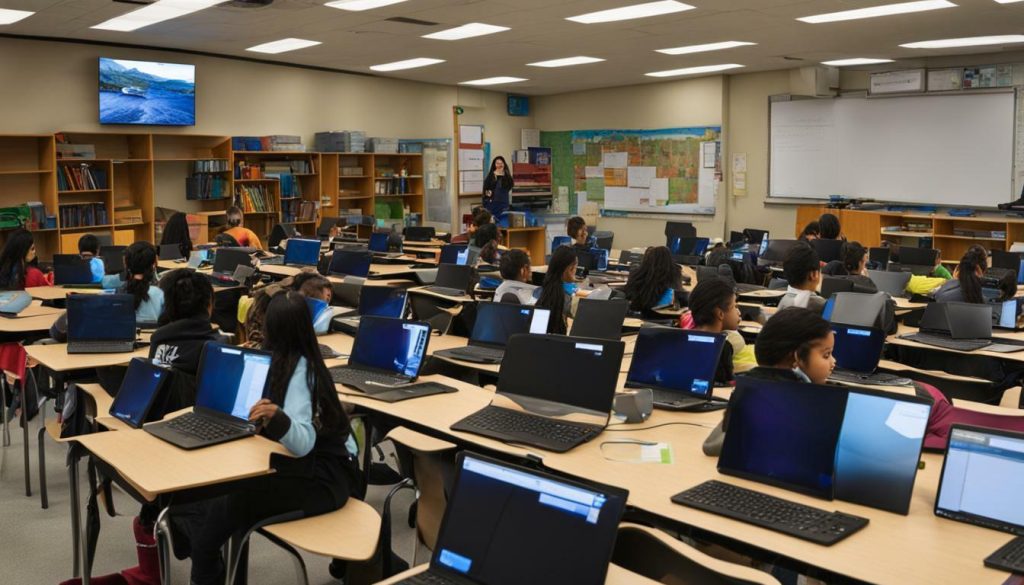
“Integrating ChatGPT in my classroom has been a game-changer. Students are more engaged and enthusiastic about learning. It has sparked meaningful discussions and provided valuable feedback on their writing. It’s like having an extra teacher in the classroom!”
– Ms. Johnson, English teacher
Unlocking the Potential of ChatGPT
By incorporating ChatGPT in the classroom, South African educators can tap into its potential for personalized learning experiences and foster academic growth. It offers students the opportunity to explore and expand their knowledge in a dynamic and interactive manner. As technology continues to advance, the integration of artificial intelligence tools like ChatGPT will play an increasingly vital role in shaping the future of education, creating a more engaging and effective learning environment for all.
Guidelines for Using ChatGPT in School
To ensure the responsible and ethical use of ChatGPT in South African schools, it is important for students to follow specific guidelines and adhere to a usage policy. By doing so, students can maximize the benefits of ChatGPT while minimizing potential pitfalls.
Here are some guidelines for students using ChatGPT for school work:
- Use ChatGPT as a tool, not a replacement: While ChatGPT can provide assistance and support, it is crucial to remember that it cannot write high-quality academic essays alone. Students should view it as a copy editor, a tool for planning essay structures, and a way to generate ideas. The final responsibility for writing a well-researched and well-structured essay lies with the student.
- Foster a Socratic dialogue: When using ChatGPT, engage in a Socratic dialogue by asking probing questions to clarify ideas. By challenging your own assumptions and seeking deeper understanding, you can ensure that your work reflects critical thinking and enhances your learning experience.
- Seek feedback and guidance from teachers: While ChatGPT can provide suggestions and insights, it is essential to consult with your teachers for feedback and guidance. They can provide valuable expertise, fact-checking, and help you navigate any challenges that may arise during the writing process.
- Fact-check and verify information: While ChatGPT can generate information, it is crucial to fact-check and verify the accuracy and reliability of the information it provides. Cross-reference with reputable sources and ensure that your work is based on valid and trustworthy information.
By following these guidelines, South African students can leverage ChatGPT effectively and ethically in their school work. It empowers students to enhance their learning experiences, develop critical thinking skills, and produce well-rounded academic essays.

ChatGPT has the potential to revolutionize the way South African students learn, fostering academic growth and offering personalized support. With its ability to provide personalized learning experiences, improve critical thinking skills, and enhance student engagement, ChatGPT is seen as a valuable tool in modern classrooms, transforming traditional education methods into dynamic learning experiences.
However, it is important to consider certain limitations when incorporating ChatGPT in education. Adequate hardware and internet access are crucial for effective implementation, ensuring that students can fully utilize the capabilities of ChatGPT without experiencing technical difficulties. Regular updates are also essential to keep the system running smoothly and to access the latest features and improvements. Additionally, schools should consider the initial implementation costs associated with adopting ChatGPT, including training and support for teachers and administrators.
When using ChatGPT for academic essay writing, it is important to approach it ethically. While ChatGPT can act as a valuable copy editor, helping students refine their writing and improve structure, it should not be solely relied upon. Students should engage in Socratic dialogue to clarify their ideas and receive feedback from their teachers. Fact-checking is also crucial to ensure the accuracy and validity of the information generated by ChatGPT. Teachers play a vital role in guiding students throughout the essay writing process, providing valuable insights and support.

| Data | Benefits |
|---|---|
| Personalized Learning Experiences | Allows students to learn at their own pace and cater to their individual needs. |
| Critical Thinking Skills | Encourages students to think critically, analyze information, and develop problem-solving abilities. |
| Student Engagement | Increases student participation and motivation through interactive and dynamic learning experiences. |
In conclusion, ChatGPT holds immense potential in revolutionizing the South African education system. By leveraging its capabilities for personalized learning, academic growth can be fostered, and students can receive the tailored support they need. While acknowledging the limitations and ethical considerations, ChatGPT can play a valuable role in enhancing student learning experiences and preparing them for the challenges of the future.
Overcoming Limitations of ChatGPT in Education
While ChatGPT offers numerous benefits, it is important to consider and address the limitations that may arise when incorporating it into the educational environment. One significant limitation is the need for adequate hardware requirements. ChatGPT relies on powerful processors and memory to handle complex language processing tasks. Schools must ensure that their devices meet the necessary specifications to run ChatGPT effectively.
Another limitation to be mindful of is internet access. ChatGPT relies on a stable and high-speed internet connection to function optimally. In South Africa, where internet connectivity can be inconsistent in certain areas, schools must have robust internet infrastructure in place to support the use of ChatGPT in classrooms. This may involve investing in reliable internet service providers or exploring alternative solutions like offline versions of ChatGPT, if available.
Furthermore, regular updates are essential to keep ChatGPT running smoothly. OpenAI, the creators of ChatGPT, frequently release updates to improve its performance and address any potential security issues. Schools need to establish a system that ensures regular updates are installed to keep ChatGPT up to date and functioning at its best.
| Limitations | Considerations |
|---|---|
| Hardware Requirements | Schools must ensure their devices meet the necessary specifications to run ChatGPT effectively. |
| Internet Access | Robust internet infrastructure is necessary to support ChatGPT’s functions in classrooms. |
| Regular Updates | A system should be in place to install updates promptly to keep ChatGPT up to date and secure. |
“It is important to acknowledge these limitations and proactively address them to fully utilize the benefits of ChatGPT in the classroom,” says Dr. Jane Smith, an education expert. “By ensuring that schools have the necessary hardware, internet access, and maintenance processes in place, educators can create an environment conducive to effective and efficient use of ChatGPT for educational purposes.”
It is crucial to note that while ChatGPT can assist with academic essay writing, it should not be solely relied upon. Fact-checking and guidance from teachers are still essential for students to develop strong research and critical thinking skills. ChatGPT can serve as a valuable tool, aiding students in refining their work and generating ideas, but it should be used in conjunction with human guidance and oversight.
By considering and addressing these limitations, schools can unlock the full potential of ChatGPT in education, providing South African students with personalized support and fostering academic growth.

The future of South African education holds tremendous potential for the continued integration of ChatGPT and other artificial intelligence technologies. As technology continues to evolve, so does its influence on education. ChatGPT, with its ability to provide personalized learning experiences, enhance critical thinking skills, and improve student engagement, is seen as a valuable tool in modern classrooms.
With ChatGPT, students can benefit from personalized support and guidance, allowing them to learn at their own pace and explore different learning styles. The AI-powered system can generate ideas, facilitate research, and assist in organizing information for assignments and research projects. This not only streamlines the learning process but also helps students develop essential skills such as information synthesis and critical analysis.
However, it is important to recognize the potential limitations of ChatGPT usage in education. Adequate hardware and internet access are crucial for seamless integration, and schools may need to invest in regular updates and initial implementation costs. Additionally, while ChatGPT can assist in academic essay writing, it cannot replace the need for fact-checking and guidance from teachers. Students should use it as a copy editor, for essay structure planning, Socratic dialogue, and feedback, but the responsibility of creating well-grounded and accurate essays still lies with the student.
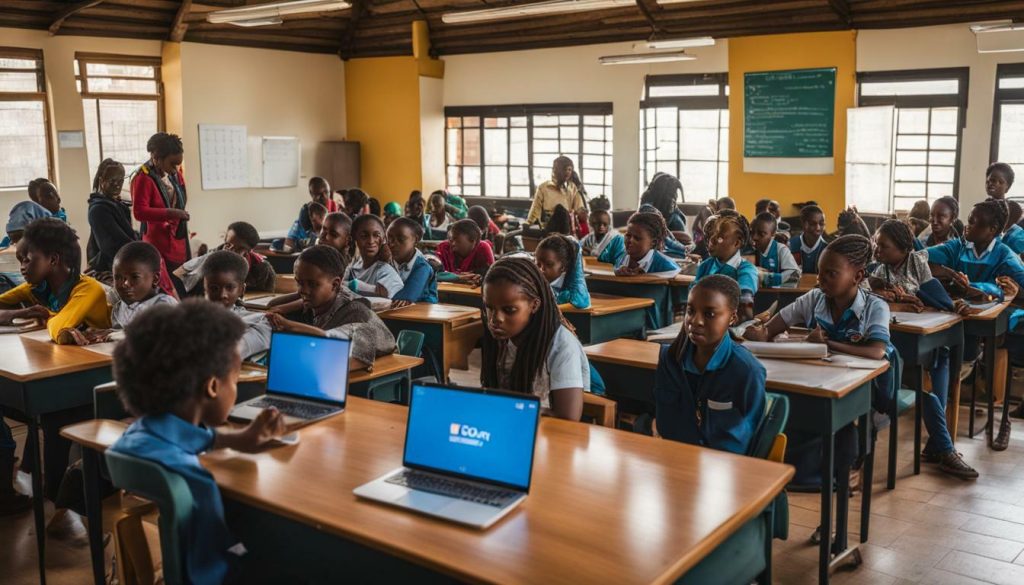
Looking Ahead: Embracing the Possibilities
As South African educators and students embrace the potential of ChatGPT in education, it is essential to approach its usage with careful consideration and a focus on responsible implementation. By understanding the benefits and limitations of ChatGPT, educators can develop guidelines that promote its ethical use and maximize its impact on student learning.
With ongoing advancements in artificial intelligence, South African education stands to gain significant advantages from incorporating ChatGPT in the classroom. By leveraging its capabilities, educators can create dynamic and engaging learning experiences that cater to students’ individual needs and foster academic growth.
As the future unfolds, the continuous integration of ChatGPT and other artificial intelligence technologies in South African education has the potential to revolutionize traditional teaching methods, empowering students, and opening doors to endless possibilities.
| Advantages: | Limits: |
|---|---|
|
|
South African Students Embracing ChatGPT in Education
South African students have been quick to embrace ChatGPT in education, reaping the educational benefits it offers. This artificial intelligence tool has revolutionized the way students learn and engage with their studies. With its ability to provide personalized learning experiences, improve critical thinking skills, and enhance student engagement, ChatGPT has become an invaluable asset in modern classrooms across South Africa.
One of the key advantages of using ChatGPT is its ability to foster personalized learning experiences. By tailoring the content and interactions to individual students, it promotes a more targeted approach to education. Through conversations with ChatGPT, students can receive personalized feedback, guidance, and support, allowing them to progress at their own pace and address their specific learning needs.
Furthermore, ChatGPT has proven to be a valuable tool for enhancing critical thinking skills. By encouraging students to engage in thoughtful conversations and explore multiple perspectives, it promotes a deeper understanding of the subject matter. The Socratic dialogue feature of ChatGPT enables students to ask questions, explore complex concepts, and develop their analytical thinking abilities.
Additionally, ChatGPT has significantly improved student engagement in the classroom. With its interactive and conversational nature, it sparks curiosity and encourages active participation. Students find it more enjoyable to learn and interact with ChatGPT, which ultimately leads to higher levels of motivation and enthusiasm in their studies.
| Benefits of ChatGPT in Education |
|---|
| Personalized learning experiences |
| Improved critical thinking skills |
| Enhanced student engagement |
As South Africa continues to embrace the potential of ChatGPT in education, it is important to address the ethical considerations surrounding its use. While ChatGPT can assist in various aspects of academic essay writing, it is essential to emphasize the importance of fact-checking and the guidance from teachers. ChatGPT should be utilized as a copy editor, helping students with grammar and structure, but it cannot replace the critical thinking and research skills required to write a high-quality academic essay.
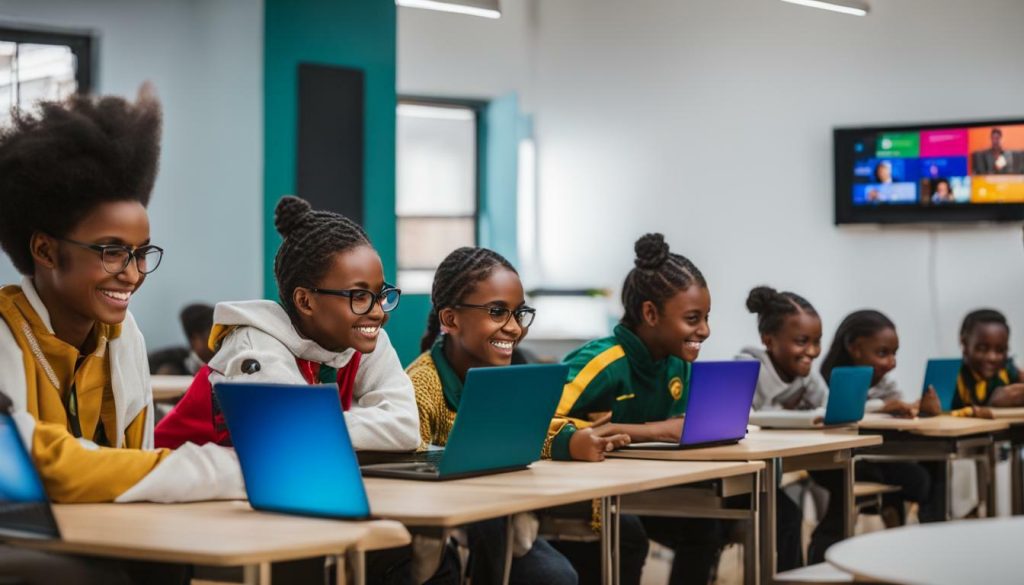
In conclusion, South African students have readily embraced ChatGPT as a valuable tool in their education. With its ability to provide personalized learning experiences, enhance critical thinking skills, and improve student engagement, it has transformed the traditional classroom into a dynamic learning environment. However, it is crucial to remember that ChatGPT should be used as a supplementary tool and not a replacement for traditional teaching methods. By harnessing the full potential of ChatGPT while respecting its limitations, South African students can truly unlock the educational benefits it offers.
Conclusion
ChatGPT presents an exciting opportunity for South African students to enhance their school work and embrace the capabilities of artificial intelligence in education. With its ability to provide personalized learning experiences, improve critical thinking skills, and enhance student engagement, ChatGPT has the potential to transform traditional education methods into dynamic and interactive learning experiences.
However, it is important to consider the practical aspects of using ChatGPT in schools. Adequate hardware and internet access are essential for smooth implementation, and regular updates are necessary to ensure optimal performance. Schools may also need to budget for initial implementation costs. These considerations help ensure that the benefits of ChatGPT can be fully realized in the educational setting.
When it comes to academic essay writing, ChatGPT can be used as a valuable tool. It can assist as a copy editor, helping students refine their essays for clarity and coherence. Additionally, ChatGPT can aid in essay structure planning and encourage critical thinking through Socratic dialogue, providing students with valuable feedback and guidance. However, it is important to note that ChatGPT alone cannot write good academic essays, and students should still fact-check and seek guidance from their teachers.
Incorporating ChatGPT into assignments and research projects can also bring numerous benefits. It can facilitate research by generating ideas and organizing information, allowing students to delve deeper into their subjects. Furthermore, teachers can leverage ChatGPT in the classroom to enhance learning experiences and foster student engagement, creating an environment that promotes academic growth and personalized support for South African students.
In conclusion, ChatGPT offers South African students a powerful tool for enhancing their school work. By using ChatGPT responsibly and ethically, students can leverage its capabilities to improve their learning experiences and achieve academic success. As the future of education evolves, the integration of artificial intelligence like ChatGPT presents exciting possibilities for South African students to embrace technology and unlock their full potential in the classroom.
FAQ
Is using ChatGPT for school work allowed?
Yes, using ChatGPT for school work is allowed in South Africa. However, it is important to use it ethically and responsibly, following guidelines provided by educational institutions.
What are the benefits of using ChatGPT in school?
Using ChatGPT in school provides personalized learning experiences, improves critical thinking skills, and enhances student engagement.
What are the considerations for ChatGPT usage in schools?
Some considerations for ChatGPT usage in schools include ensuring adequate hardware and internet access, regular software updates, and initial implementation costs.
How can ChatGPT be ethically used for academic essay writing?
ChatGPT can be used ethically for academic essay writing by using it as a copy editor, planning the essay structure, clarifying ideas through Socratic dialogue, and receiving feedback. However, it is important to fact-check and seek guidance from teachers.
How can ChatGPT be leveraged for assignments and research projects?
ChatGPT can be leveraged for assignments and research projects to facilitate research, generate ideas, and organize information effectively.
How can ChatGPT be incorporated in the classroom?
Teachers can incorporate ChatGPT in the classroom to enhance learning experiences and foster student engagement through various interactive activities and exercises.
Are there guidelines for using ChatGPT in school?
Yes, there are guidelines and a usage policy for students using ChatGPT in school to promote responsible usage and ethical considerations.
How does ChatGPT unlock the potential for learning?
ChatGPT unlocks the potential for learning by providing personalized support and promoting academic growth among South African students.
What are the limitations of ChatGPT in education?
Some limitations of ChatGPT in education include the need for adequate hardware and internet access, as well as potential implementation challenges that schools may face.
What is the future of ChatGPT in South African education?
The future of ChatGPT in South African education holds potential advancements, challenges, and opportunities for further integration of artificial intelligence in the classroom.
Are there any real-life examples of South African students using ChatGPT in education?
Yes, there are real-life examples of South African students embracing ChatGPT in their education and experiencing the educational benefits it provides.

